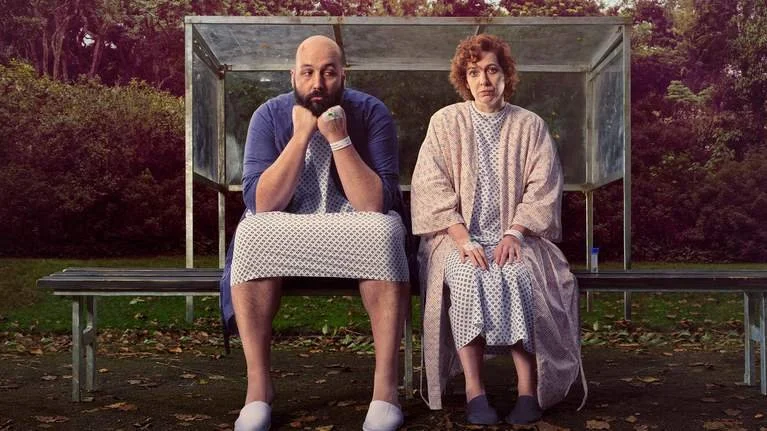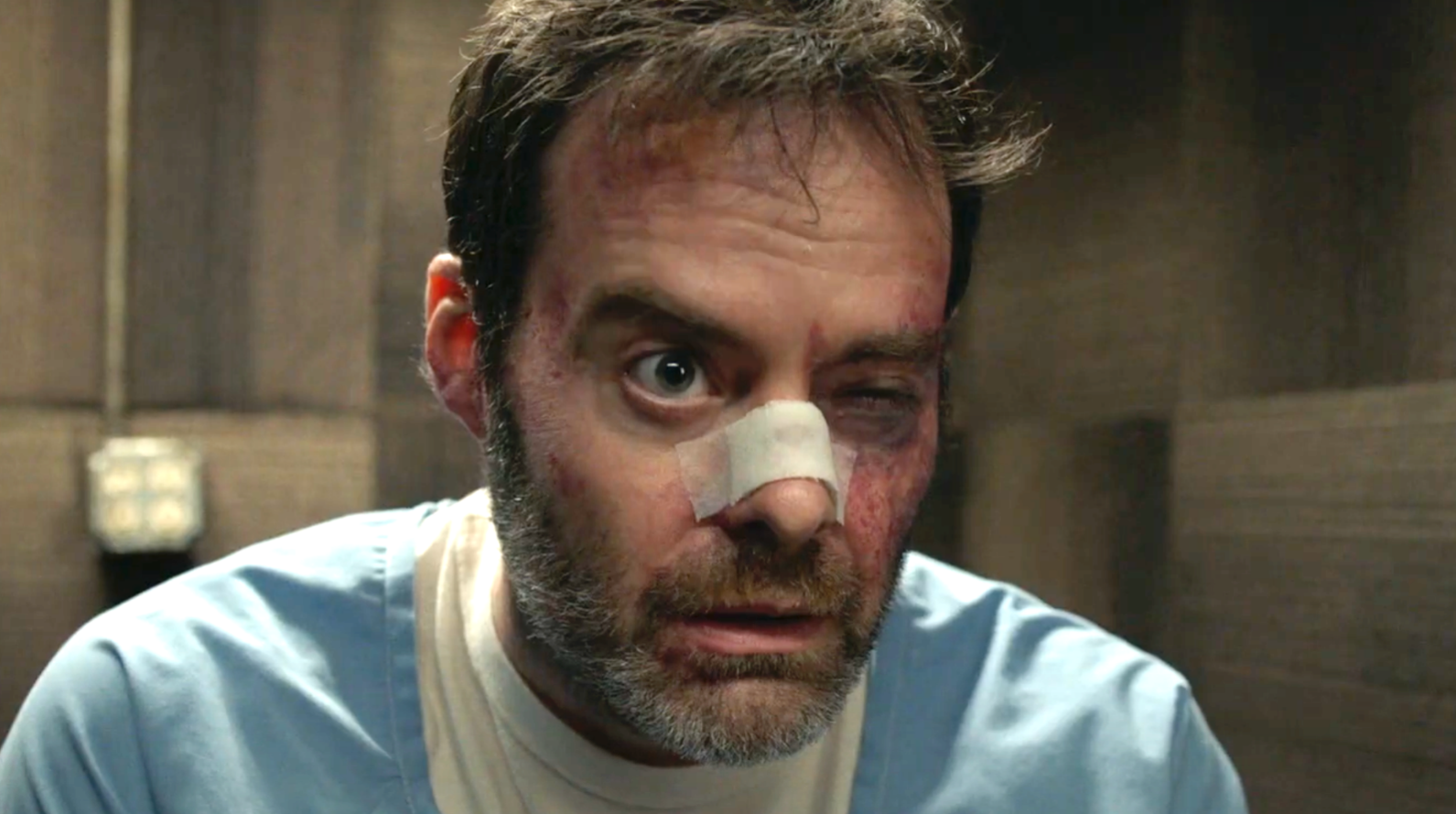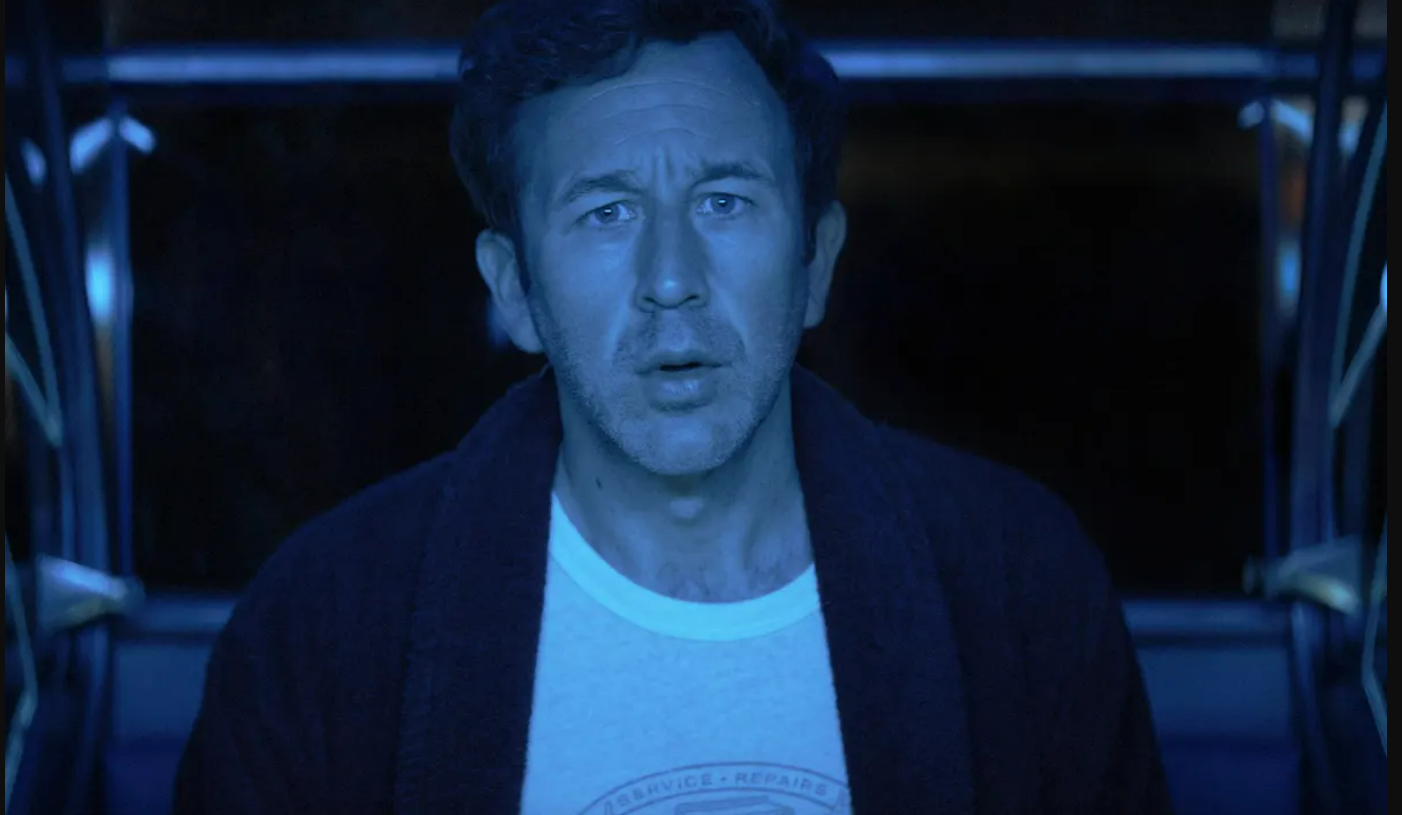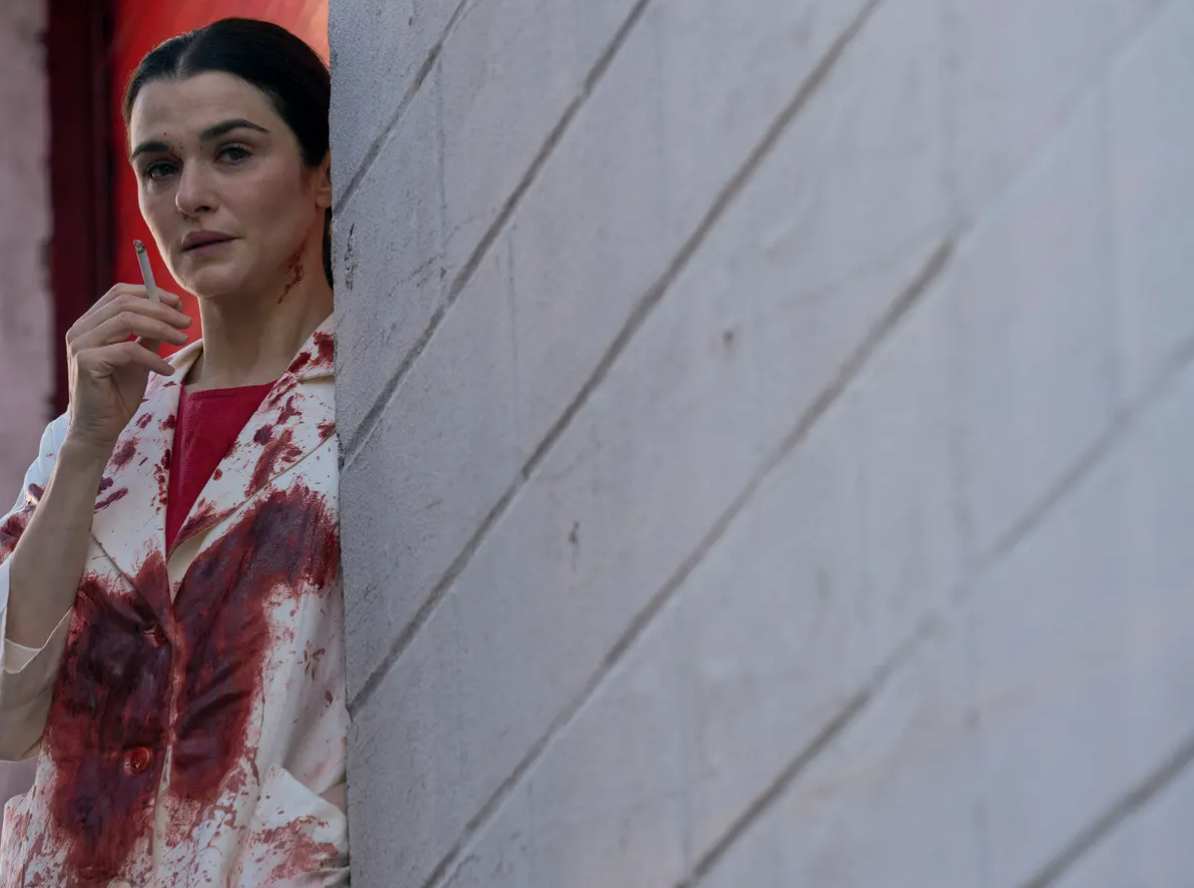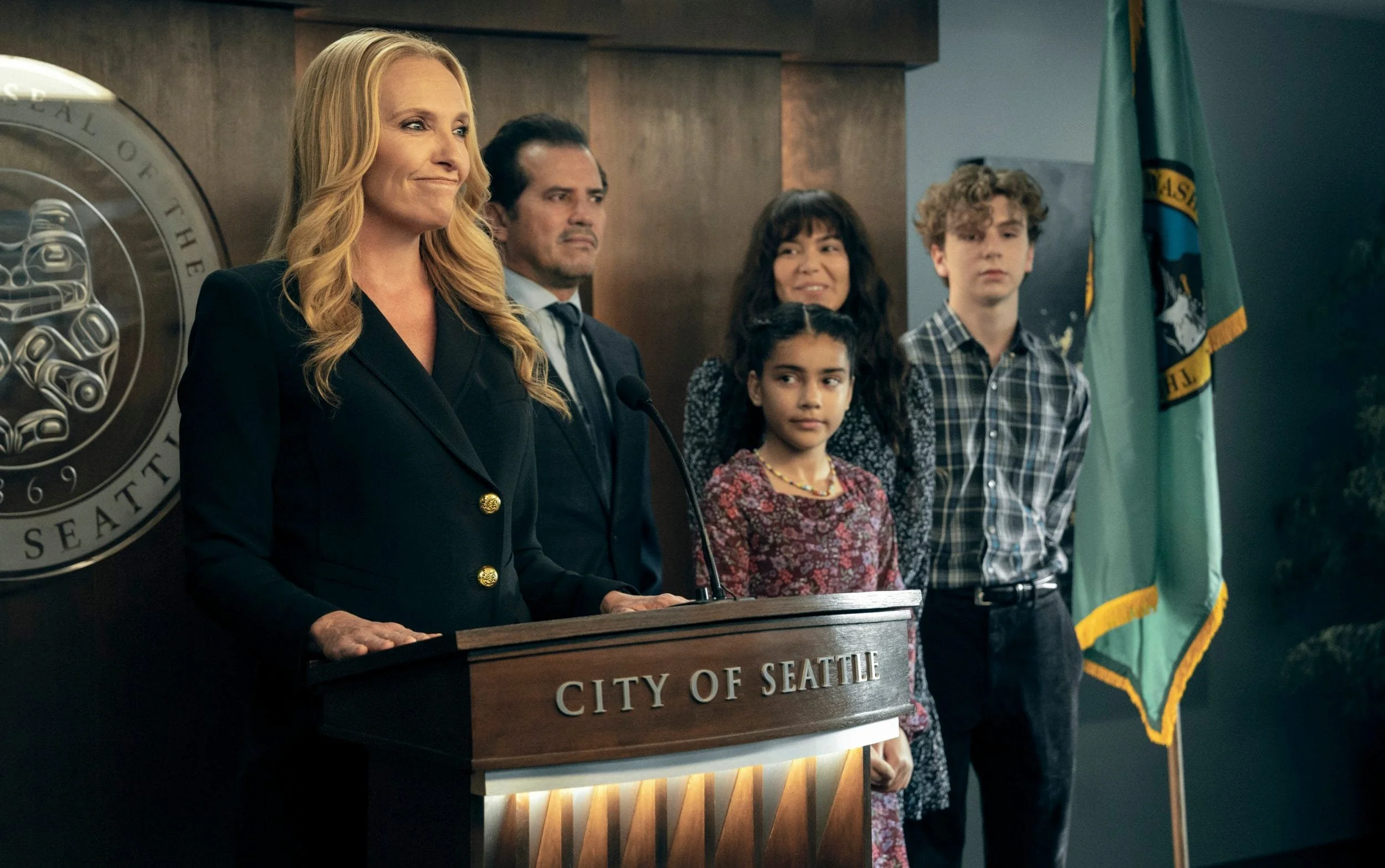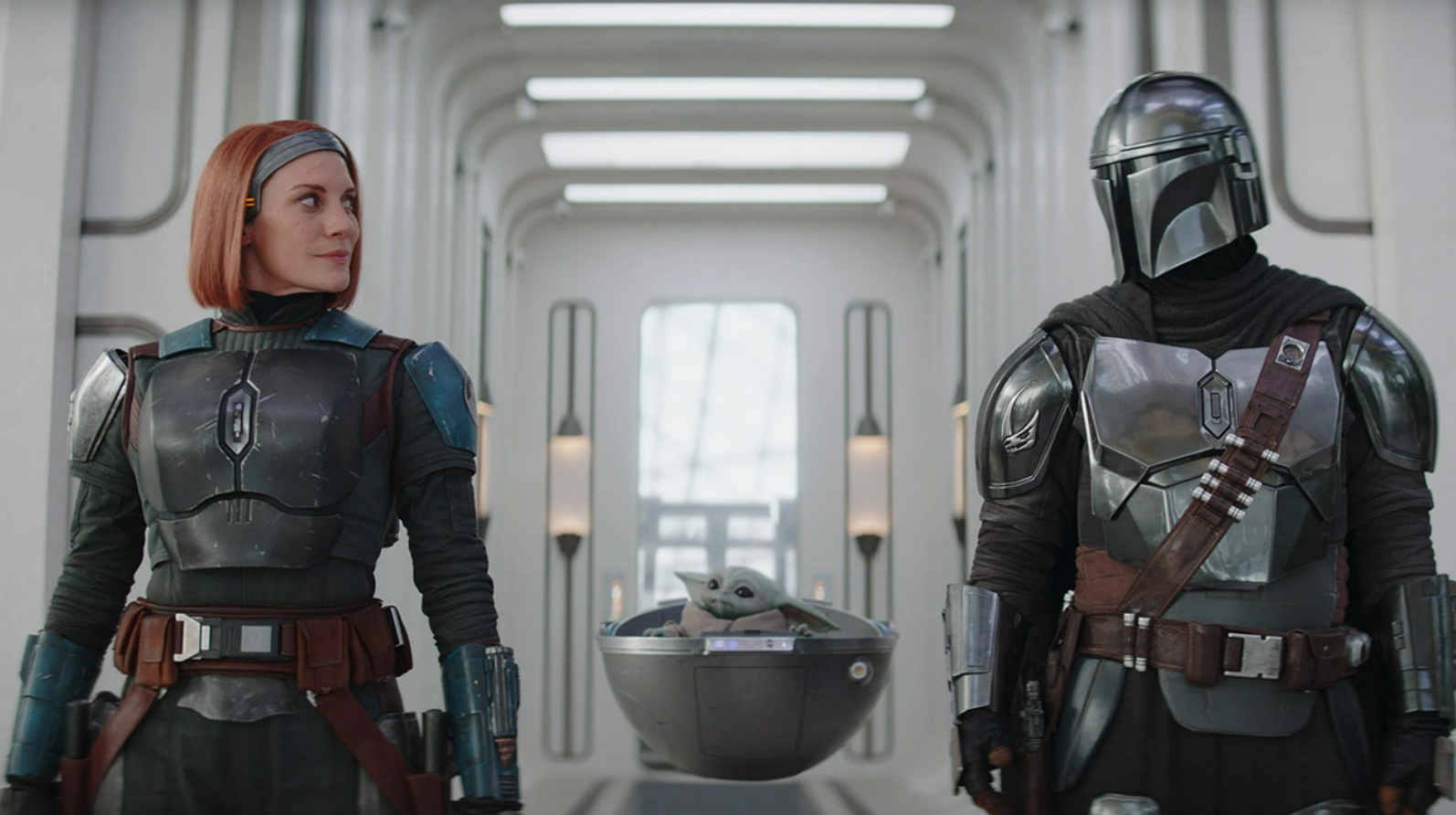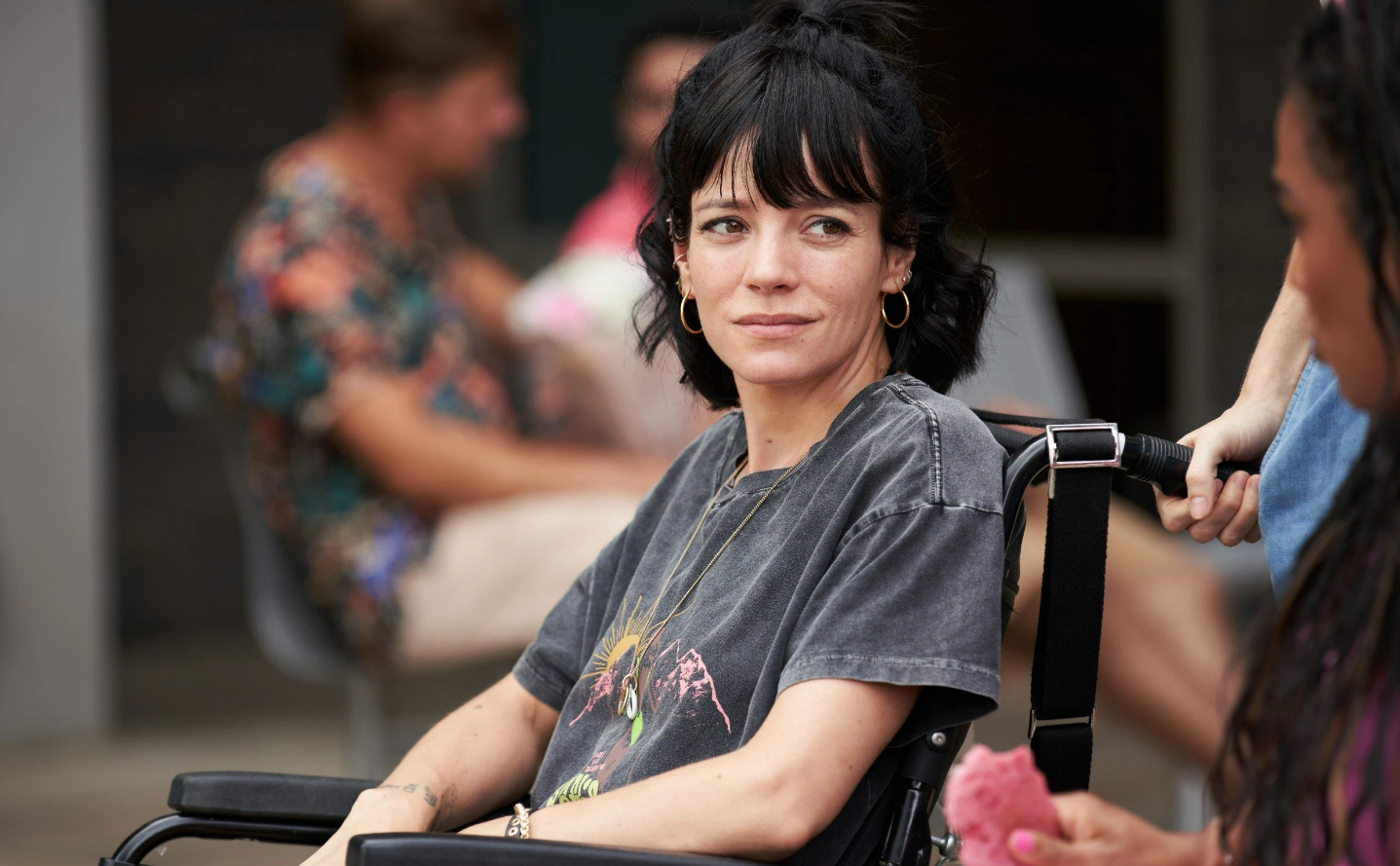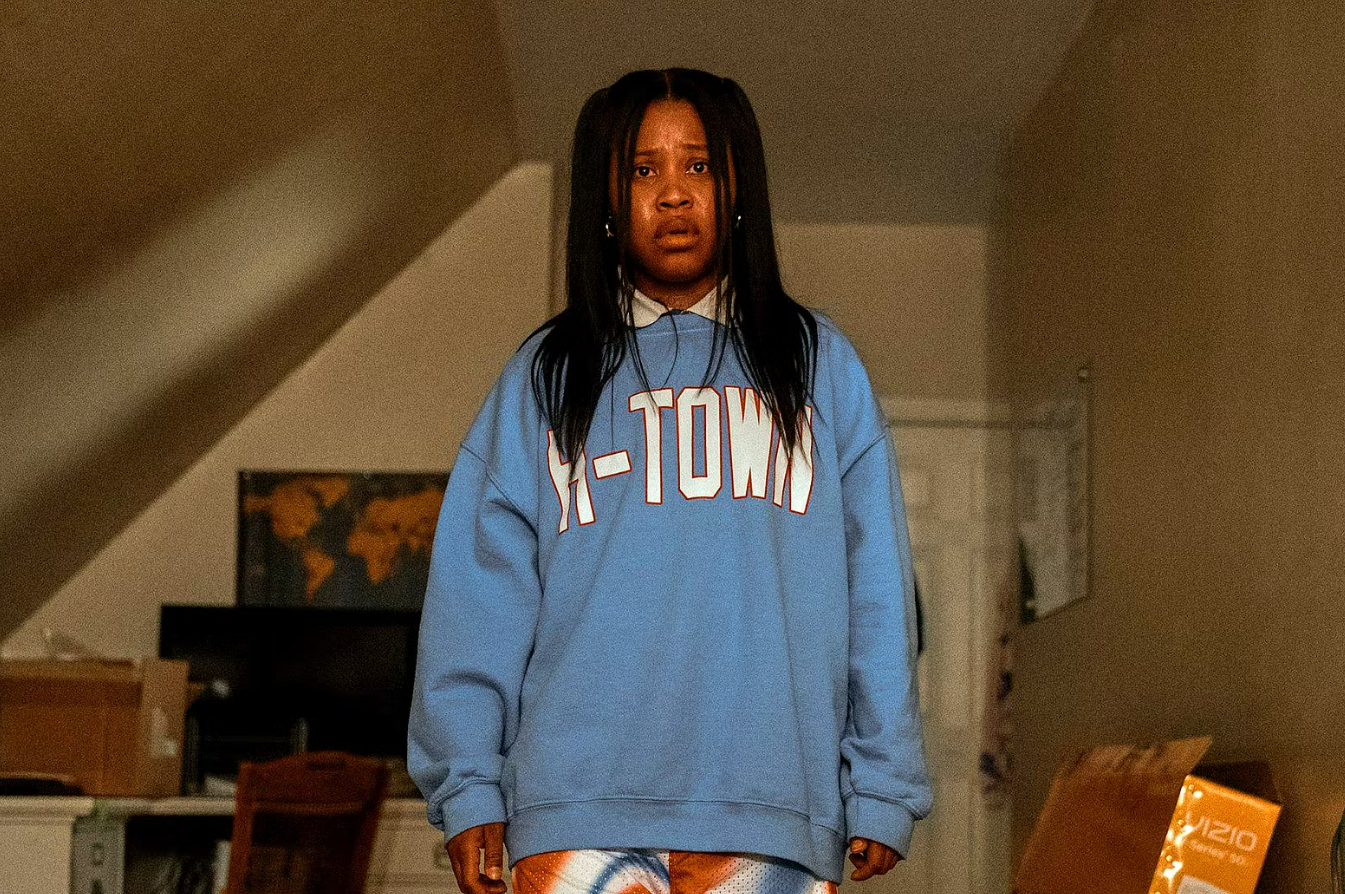Black Mirror S6 E1 – Joan Is Awful
The first episode of the new Black Mirror series is a darkly comic exploration of deep-fake technology.
Available on Netflix now
The return of Charlie Brooker’s dark anthology series is ushered in by Joan Is Awful, which is directed by Ally Pankiw (Feel Good) and written by Brooker. The episode is focused on its titular main character (played by Annie Murphy of Schitt's Creek fame), a disillusioned tech CEO who is shocked to discover that the events of her life are being retold almost in real-time by a streaming app that bares an uncanny resemblance to Netflix.
This revelation bizarrely puts Joan in the crosshairs of Salma Hayek, who appears to be playing her in the lead role of the hugely popular show. However, thanks to a wild encounter involving a considerable amount of Burger Kings, an ensuing dicky tummy, and a church wedding, we soon discover that Hayek, like Annie, has been duped by the aforementioned streaming giant’s term and conditions, and is actually only in the show via a CGI rendering of her likeness.
Sure enough, Joan and Hayek are soon on a collision course with their high-tech nemesis, in a standoff which sees Black Mirror indulge its trademark propensity for playing with multiple genres (in this case action, comedy, and science fiction). Though the final act of Joan Is Awful didn’t entirely work for me, the episode does pose timely questions about companies’ use of personal data and image rights, and the burgeoning reality of deep-fake technology within the entertainment industry.
The latter topic is perhaps the most compelling (check out Adam Buxton’s recent interview with Tom Hanks for a more refined perspective on its implications) and does cause one to ponder what the future of mainstream entertainment might look like in years to come. Joan Is Awful isn’t perhaps the most plausible analysis of this, but nonetheless ought to be credited for raising the issue.
Significant Other, ITVX
The opening scene of Significant Other, a show that forms part of the powerful rebrand of ITVX, is a profoundly unique piece of screenwriting. Sam (Youssef Kerkour) is about to die of an overdose, when he is interrupted by Anna (Katherine Parkinson) who is dying of a heart attack. Comedy might be back in the building at ITV, but we don’t remember it being like this.
Youssef Kerkour and Katherine Parkinson are an undeniably charming double act. The world and setting of Significant Other is stripped back and basic, giving their dual performance the feeling of a theatre two hander for long stretches. The city of Manchester is a distinct character in its own right during the fleeting moments that Sam and Anna leave the confines of these quirky flats.
While the set up of the show is profoundly unique, as mentioned above, the rest of the series is decidedly more familiar. It presents us with well-worn romantic comedy tropes (staging a date to make an ex jealous; an unwanted pregnancy announcement). Although it’s intention is to subvert these tropes, it doesn’t quite manage to do it in the same way it masterfully subverted the meet cute in the series opener.
How dark does this comedy go? Really quite dark when you reflect on it. The two characters both express genuine interest at points of wanting to be dead. There are incisive monologues on depression that will resonate with anyone that has suffered from the malaise, especially as it relates to relationships.
The brief moments of light that emerge from the darkness are warming and illuminating. Anna’s reflection on presence of mind and the simple pleasure of “taking a bottle of cranberry juice going to Sackville Gardens, lying on the grass in the sun and having a brilliant afternoon [sic]” is a tonic for any audience member in the depths of heartbreak or general sadness.
Significant Other at its core is a facetious reflection on love and death. It arrives at the conclusion (as if we don’t all know it deep in our hearts) that we all need love. Otherwise we will die.
Barry (Season 4)
The fourth and final season of Alec Berg and Bill Hader’s odd delight is expertly delivered.
Available on Now TV and Sky Atlantic
Barry has long been one of the most curious shows on mainstream television, it being an odd combination of action, comedy, and drama. For four seasons, we have watched veteran/hitman/actor Barry Berkman (Bill Hader) attempt to exorcise his demons and commence a new life, only to find himself frequently pulled back into the murk of Los Angeles’ criminal underworld.
Given their creation’s unique premise, Hader and co-creator Alec Berg could be forgiven for finding this final act a difficult one to land, and yet no such difficulty can be detected in a fourth series that is tight, expertly paced, and neatly concluded. Hader is once again in fine fettle, reiterating his position as one of contemporary comedy’s most unique voices, as are co-stars Henry Winkler, Sarah Goldberg, Stephen Root, and Anthony Corrigan.
Interestingly, this chapter of Barry elects to continue the show’s recurring motif of leaping between timeframes and questioning the reliability of its characters’ memories and points of view, making for a viewing experience that is both challenging and rewarding. The oddity of the central narrative also brings an air of pulp fiction to proceedings, with the real-life absurdity of the film industry also granting an unlikely air of believability to events.
Hader and Berg also ought to be credited for ending their show at an appropriate time. When you have a hot property on your hands, it can be tempting to keep it pumping for as long as possible, but this is a well-executed swansong that will secure the legacy of their impressively quaint show.
Succession (Season 4)
The glorious finale of this once-in-a-generation show doesn’t disappoint.
Available on Now TV and Sky Atlantic
It’s not immediately easy to understand why Succession has evolved into a global phenomenon over its four-series run. At first glance, it is a quick-witted and uber-detailed boardroom drama that unsubtly throws shade at the Machiavellian families that have gradually moulded American politics to reflect their own image.
Though that in itself is an interesting and timely premise, it does not account for what makes Jesse Armstrong’s magnum opus the rare beast that it is. No, that would be the discordant Roy family that lie at the epicentre of the show. For four seasons, we have witnessed how the machinations of patriarch Logan (Brian Cox) have impacted Kendall (Jeremy Strong), Roman (Kieran Culkin), and Shiv (Sarah Snook).
Shockingly, this final series allowed us to see how Logan’s demise (which shockingly came as early as episode three) would be treated by his offspring. And, true to form, it was an ugly spectacle. Despite all of the abuse their father made them endure, the Roy children never managed to truly step out of his shadow, with the final episodes seeing them engaged in a bitter power struggle that ultimately wrought them nothing other than a hollow cash prize.
By the final refrains of Succession’s final episode, scored impeccably for the last time by Nicholas Britell, we were made to contemplate a depressing conclusion in which no character was redeemed. Kendall’s life was in tatters as he contemplated a future beyond the legacy he had always expected, albeit in vain, to inherit. Roman’s own personal tragicomedy ended as badly as we always expected it would, with the show’s malicious court jester looking every bit the stilted man-child he always was.
Perhaps the bleakest fate, however, belonged to Shiv, who seemingly opted for a life spent on the arm of the improbably triumphant Tom (Matthew Macfadyen), whose own arc concluded with him being unexpectedly anointed as the newly minted CEO of the Logan empire.
Though such a joyless finale may initially come as a surprise, it doesn’t require deep consideration to realise that this was always how Succession was destined to end. After all, this is fundamentally a show about the consequences of people’s actions, be it a father’s rejection or the illegal crowning of a new POTUS. Indeed, the despair felt by the show’s three main characters could even be viewed as just desert for the litany of sins we have seen them commit over the show’s glorious five-year run.
Prestige dramas of this ilk come along once in a blue moon, but Succession really ought to be considered amongst the very best of them. You only need to look as far as episodes three, seven, eight and nine of this final series to appreciate the intricacy of the world Armstrong has created, and to feel the depth of emotions that lie beneath the surface of its biting, infinitely quotable dialogue.
Truly, this is a televisual triumph that ought to be treasured for the ages.
Ted Lasso (Season 3)
The final series of this great show might not be perfect, but it provides a fitting send-off for (most) of its cherished characters.
Available on Apple TV+
Goodbyes are never easy, especially when they’re directed at people we love. And it’s fair to say that is how fans of this affecting series have come to feel about its characters.
Whether Ted Lasso’s presumed swansong proved to be a fitting one is a topic for debate, with its final episode managing to wrap up many, but not all, of the show’s narrative threads. For some, such as Jason Sudeikis’ titular protagonist, it was a near-perfect conclusion to a three-series arc that has demonstrated tangible development and admirably explored complex and timely topics such as anxiety and toxic masculinity.
The same can arguably be said for other key characters such as Rebecca (Hannah Waddingham), who finally stepped out of the past and into her future, and Roy (Brett Goldstein), who learned what it means to be a true leader. Sadly, that’s not the case for the likes of Keeley (Juno Temple) and Nathan (Nick Mohammed), whose roles are impacted negatively by the show’s decision to pivot towards a more individualistic means of storytelling.
Nonetheless, when at its best, Ted Lasso remains a charming endeavour that can make you laugh and cry in equal measure, one that has a propensity to craft brave stories (such as Colin’s coming-out storyline) which are sadly not commonplace within the morally bankrupt industry in which it is set. More importantly, in an increasingly cynical world, this was a show that really could make you feel and, for that reason alone, I will miss it.
The Gallows Pole, BBC
What does a period drama made by Shane Meadows look like? The man who made his name through minimalist, verité, cheap and often amateur filmmaking? The answer is…it is a bit weird… certainly to start with.
If you’re expecting an intricately detailed period world containing contemporaneous vernacular delivered by highly regarded theatre actors, you won’t get it, The Gallows Pole is This is England, incidentally set in the 1700s.
Meadows sticks to his distinctive long takes, improvised dialogue and working-class mischief in this series. In doing so he takes the period drama genre and shows us a completely different side to it. It’s a jarring and daring set of stylistic choices that demonstrate how unbeholden Meadows is to established ways of doing things.
Dave (Michael Socha) and Grace’s (Sophie McShera) relationship forms the backbone of The Gallows Pole, establishing the show as a nuanced, cheeky and beautiful love story. Both actors are irresistibly charming and full of life across the three episodes. Socha is particularly hilarious with the looks and the lines that Meadow’s improvisational freedom allows him. Grace is an example of how well Meadows creates strong, funny and unpatronising female characters within worlds where the patriarchy is firmly intact.
Like the rest of the Warp Films canon, you can rely on The Gallows Pole to build to an exciting narrative climax and set piece. By the third episode, the show firmly finds its rhythm and has us excited to see how Dave and Grace’s heist will play out. Episode Three is Shane Meadows in his pomp, a finale that contains the threat of terrible violence as well as Shakespearean light relief through Mand (Stevie Binns) and Broadbent (Adam Fogerty).
The series ending is pure euphoria. It uses our expectation of violence as a misdirect, and instead basks in the simple joy that money can bring to a community that has none (a particularly powerful image in a cultural climate where scarcity is not merely confined to the past). The final scenes are set to Nick Mulvey – Fever to the Form one of a number of beautiful and transcendent music choices.
Shane Meadow’s body of work contains some of the most intricate records of British violence, mischief, catharsis and hard won happiness. He can proudly add The Gallows Pole to that stunning oeuvre.
The Big Door Prize
This small-screen adaptation of an M.O. Walsh novel flirts with a deeper purpose, but settles for being something far less challenging.
Available on Apple TV now
Apple have settled on a somewhat familiar formula for their comedy series as of late. There’s usually at least one big name attached to the project, its set often includes implausibly gorgeous properties that usually belie the characters’ humble professions, and its tone is, more often than not, very twee.
That is certainly true of The Big Door Prize, with Chris O’Dowd taking top billing as a humble high school teacher whose life, along with those of the residents of his sleepy hometown, is thrown off kilter by the arrival of a mysterious machine that predicts its user’s life potential. Such a concept alludes to a deeper meaning than anything the show (which is itself adapted from M.O. Walsh’s novel of the same name) ever manages to display, with showrunner David West Read (of Schitt’s Creek fame) electing to keep things safe and mostly inconsequential.
Nonetheless, The Big Door Prize is not without its charms. O’Dowd is typically amiable, co-star Gabrielle Dennis does good work in a more polarising role, while relative newcomers Sammy Fourlas and Djouliet Amara arguably steal the show as forbidden teenage lovers. Subsequently, this is likely to please viewers in search of some harmless, good-natured fluff.
Dead Ringers
Rachel Weisz is on riotous form in Alice Birch’s so-so adaptation of a Cronenburg flick.
Available on Amazon Prime
This small-screen adaptation of David Cronenberg’s 1988 film could easily have been called Bad Sisters, had Sharon Hogan not already called dibs on it. Nonetheless, like Horgan’s excellent Apple TV comedy, this is a project that is almost entirely focused on femininity and sisterhood within the sphere of modern times. Though it may not be as funny or empathic as that show, it is an intriguing and challenging experience that further demonstrates Amazon’s commitment to making unsettling dramas (it’s no coincide that this closely followed the release of Donald Glover’s Swarm).
Dead Ringers is adapted by the British writer Alice Birch and it’s quickly easy to identify the fingerprints of her previous television work, specifically the complex sexual dynamics of Normal People and the biting dialogue and innate cynicism of Succession. Sadly, this project doesn’t quite manage to meet the lofty standards of either of those works and struggles to evolve within the generous confines of its six-episode run.
Nonetheless, it’s rewarding to see a show that is so unapologetically focused on the unique trappings of womanhood, something which is demonstrated by its unflinching portrayal of pregnancy, miscarriage, and menstruation. Rachel Weisz is on stellar form in her dual lead role as twin gynaecologists whose intrinsic connection spells trouble for those that encounter them, with Britne Oldford and Poppy Liu standing out from the supporting cast.
As said, Dead Ringers never fully moves beyond its quirky central premise but, when at its best, is unnervingly good fun and arguably a career standout for Weisz, who dominates proceedings from beginning to end.
The Power, Amazon
The Power, based on the novel by Naomi Alderman, is a definitive and all-encompassing chronicle of the state of gender politics, feminism and misogyny in 2023.
The opening episodes of the series on Amazon feel massive, traversing continents as the story and its characters move from Nigeria, to the middle east, to London and back again.
Not only is the show able to move between countries, The Power is impressive in the way it manages to move between an array of feminist issues, providing a comprehensive picture of global misogyny in 2023. The series covers toxic male vloggers; the relationship between trans and womens’ rights; the desire for men to create legislation relating to womens’ bodies, as well as the show’s central provocation: what would violence against women look like if men no longer had a physical advantage over them? The way that the device of ‘the power’ is able to tie together all of these issues in one coherent narrative is a feat.
While the narrative is coherent, something about it is quite saturated and the lack of relationship between each individual story strand stifles your enjoyment and investment in the series at times.
It was maybe a strange choice to favour the bureaucratic, subtle narrative that follows Senator Margot Cleary-Lopez (Toni Collette) over the heart-wrenching and action packed strand led by Ria Zmitrowicz. Zmitrowicz played the lively, rowdy Cockney daughter of gangster Bernie Monke (Eddie Marsan) who rises through the ranks of her father’s business as it becomes clear she is now the most physically threatening. She probably should have had more airtime than she did.
The fragmented narrative strands built pace and intrigue into the final episode, where attempts were made to cross the stories, but you got the sense this could have come sooner. All in all The Power was a gigantic undertaking that, due to its scale and scope, slightly stifled your investment in individual characters.
The Mandalorian (Season 3)
This third act recovers from a dull beginning, but fails to live up to the standards of previous seasons.
Available on Disney Plus
The third season of this hugely popular Star Wars spin-off recommences after the events of the hopelessly forgettable Book of Boba Fett, with Pedro Pascal’s titular protagonist still shepherding his adopted (and endlessly marketable) child Grogu around the galaxy.
Jon Favreau’s screenplay, which was co-written with Noah Kloor and Dave Filoni, initially focuses on the anti-hero’s quest for spiritual redemption and sees him return to his tribe’s long-abandoned home of Mandalore so that he may be re-baptised in the planet’s holy waters.
As well as being a means of lessening the series’ reliance on Pascal’s physical presence (his character remains helmeted throughout), this opening gambit does effectively establish its overall premise – that being the Mandalorians’ quest to retake their homeland, a venture which eventually puts them in the crosshairs of a familiar foe.
Nobody benefits from Favreau’s commitment to world-building more than the character of Bo-Katan Kryze (played by Katee Sackhoff), who essentially assumes equal billing with Din Djarin and Grogu for much of this series.
Alas, the pacing of The Mandalorian’s third act is problematic, with many of its episodes becoming bogged down in the sort of fine detail that only the most devout of fans would care for.
It is also difficult to shake the nagging feeling that the show would have been best served by concluding at the end of its second season, when Grogu was successfully packed off to Luke Skywalker’s Jedi school. Alas, content is king in the world of Disney and it’s clear to see that this once unique tale is now just another conduit through which the larger Star Wars universe can be fleshed out.
Thankfully, this latest serving of The Mandalorian does manage to recover from an inauspicious beginning (thanks in no small part to a Jack Black and Lizzo-starring sixth episode that is delightfully bizarre) and delivers a finale that is befittingly grandstand.
Rain Dogs, BBC
Daisy May Cooper has to be on TV. There is no one that better displays and communicates what it means to be British and working class: to be rye in the face of a system cripplingly rigged against you, to never be more than three sentences away from a dick joke. Her performances are her own and might appear crude from some angles, but Rain Dogs shows her off as an actor capable of unique and sophisticated performances.
It's a completely unflinching show written by Cash Carraway (the novelist that came to prominence with Skint Estate), one that isn’t afraid to reference rape and suicide. May Cooper, as you can picture, is the perfect person to deliver the lines and you believe every second of her as a single Mum down on her luck. You admire her sardonic resilience and root for her to find a way out.
A second great performance in Rain Dogs is offered by Jack Farthing who plays Costello’s (Daisy May Cooper) best friend and simultaenous worst enemy, Florian Selby. The two’s relationship forms the backbone of the show and is definitely the programme’s most original component, something it’s hard to recall seeing before. Florian and Costello are pathologically abusive to one another, yet also capable of saving each other’s life. They are worryingly but un-romantically co-dependent. All each other has.
Neither do the two characters as individuals conform to TV archetypes or bare reference to characters you might have seen on TV or met in real life before. Even their names are weird. Florian Selby is a tortured rich boy with a personality disorder and violent tendencies. Costello Jones is a sex working writer who sleeps on lilos so that her daughter doesn’t have to. As characters, they are not easily recognisable, but they do somehow work in the main and find ways to be compelling. Florian and Costello’s friendship is beautiful and the way that Florian saves Costello from herself in the show’s finale has a deep emotional impact.
Perhaps Rain Dogs biggest draw is also its biggest flaw. That’s to say: not helping us understand why Costello and Florian have to be apart at all? Their characters are elusive but it’s clear from the first minute that they are better off together. When they go their separate ways in the middle of the series, the most frustrating question for the audience is understanding…despite their tendencies to hurt one another from time to time…why?
These are the overriding feelings you get by the end of Rain Dogs. The originality of Florian and Costello as characters, as well as their unique relationship, create a lot of moments to love in the eight-part series. But the elusive nature of their relationship can also be frustrating and lead to things feeling convoluted at times. Rain Dogs was individual, bold and indulgent to its merit, but maybe could’ve given us a bit more of what we expect from a drama of its kind.
Dreamland
Lily Allen struggles in a family affair that promises much, but offers very little.
Available on Sky Atlantic/NOW TV
Dreamland is the latest brainchild of Sharon Horgan, who has long since established herself as one of the most eminent and talented voices in television today. It is an adaptation of a short film (Morgana Robinson’s Summer) that Horgan created for Sky Arts in 2017 but is crucially only executive produced by her on this occasion.
Instead, writing duties are shared by five different voices, which perhaps explains why Dreamland struggles as badly as it does to establish an overall tone and so often regresses to the sort of broad humour that is generally associated with far inferior fare to the work Horgan is best known for. This is best characterised by the series’ annoying tendency to portray working class people as stupid and something to be sneered at, though whether it is aware of such a penchant is never entirely clear.
Also proving problematic is Dreamland’s length. At a mere six episodes, each of which are only half an hour in length, it struggles to establish its characters and their familial dynamic, which leaves its cast (particularly the debuting Lily Allen) struggling to impose themselves on the story. Freema Agyeman does a commendable job in her role, but is badly let down by a screenplay which is far too clumsy in its approach to everyday racism.
This is a shame because the premise of Dreamland, particularly coming off the back of Horgan’s outstanding work on Bad Sisters, offers plenty of intrigue. Alas, by its end, I was just keen to hop on the next bus out of Margate.
Beef
Beef on Netflix is a big deal. Created by Lee Sung Jin, the series is a who’s who of Asian-American talent and a show that looks lavish and feels effortlessly cool throughout. Beef brings Steven Yeun (The Walking Dead, Nope) and Ali Wong (most known for her pioneering stand up) together for a ride that takes the Asian-American experience as one of its key themes.
Danny (Yeun) feels the crippling, corroding obligation to provide for his parents on a contractor’s wage, whereas Amy (Wong) is worth millions but still feels jaded in her role as breadwinner. She constantly wrestles with the idea of the nuclear family.
The show’s plot is reminiscent of last year’s Best Picture Nominee: Banshees of Inisherin in that a petty grievance between its two central characters (Danny and Amy are involved in a road rage incident at the very start of the series) escalates to the point of life and death.
Beef is a show that gets better and better as it goes on. The enigmatic performances of Wong and Yeun and the cool, three dimensional LA world that Sung Jin generates, allow you to sink into the show and enjoy its characters as though you were hanging out with them.
Plot points you thought you’d left behind rear their heads at unexpected moments, working to create a thoughtful and satisfying narrative progression. Danny and Amy begin by hating each other, and tear their lives apart as a means of getting to the bottom of their beef. By the end, the show’s message is to remind us we should love each other. Danny and Amy in particular drive home the point that Asian-Americans, at a time of heightened Asian hate in America, should love each other the most.
Swarm
Donald Glover’s dark satire of stan culture makes for an engaging but frustrating watch.
Available on Amazon Prime
This dark satire of extreme fandom or ‘stan culture’ has mostly drawn attention due to the similarities between the fictional pop star at its centre and Beyoncé, though such parallels are never confirmed as being intentional by showrunners Janine Nabers and Donald Glover.
Despite the tightness of their lips, the intention of Nabers and Glover are pretty clear from the offset of Swarm, which follows Dominique Fishback’s disturbed mega-fan and her gradual descent into madness and murder. Fishback certainly makes for a convincing lead, though the back story and, by extension, motivations of her character are frustratingly never adequately expressed.
This is problematic because Swarm has a propensity for leaning into horror convention (several episodes end with Fishback offing a perceived adversary in grisly fashion) but only ever truly gets under the skin of its central topic in standalone episodes, such as Ibra Ake’s ‘Running Scared’ (which features a promising acting debut from Billie Eilish) and Stephen Glover’s true-crime parody ‘Fallin’ Through the Cracks’.
Sadly, this means that Swarm never makes for a truly rounded viewing experience and instead only occasionally flirts with the notion of being wedded to deeper, more meaningful ideas. Nonetheless, it is an intense and atmospheric watch for the most part that is powered by an impressive lead performance and effortlessly cool original soundtrack.
Abbott Elementary (Season 2)
The second season of Quinta Brunson’s series proves that it is so much more than just another workplace comedy.
Available on Disney Plus
On first glance, Quinta Brunson’s series is just another workplace comedy that is unafraid to wear the influence of The Office on its sleeve. But, with two seasons now under its belt and a third on the way, its clear that Abbott Elementary is very much its own entity.
In the context of its sophomore season, this is evidenced most by the development of characters such as Chris Perfetti’s previously inconsequential history teacher or Lisa Ann Walter’s no-nonsense Philadelphia native. Such growth complements the arcs of the show’s more prevalent personas, such as Brunson’s idealistic protagonist and the ‘will-they-won’t-they’ dynamic she shares with Tyler James Williams’ hunky, but hopelessly awkward, character.
While that budding romance makes for compellingly agonising viewing, Abbott Elementary is undoubtedly at its most endearing when focused on Janelle James’ hilariously inept principal or Sheryl Lee Ralph’s wise matriarchal figure, the latter of which was based on Brunson’s mother.
However, like any great sitcom, this show has a deeper meaning beyond its immediate events, something which is underpinned by the way in which it documents the travails underfunded public schools are made to endure. Fundamentally, this is a show about class and the impact hard working teachers can make on their students’ lives. The fact that it is so frequently charming and laugh-out-loud funny is merely a bonus.
Shrinking
Bill Lawrence and Brett Goldstein serve up another slice of charming, empathic comedy.
Available on Apple TV+
Conversations with a trusted therapist can be as comforting as a warm blanket, or as daunting as a chance encounter with one’s greatest phobia, and this is an emotional seesaw that Shrinking navigates well for the most part.
Created by Bill Lawrence and Brett Goldstein, the show follows Jason Segal’s recently widowed counsellor, who seeks to navigate his own grief by practising radical honesty with his patients, despite the ethical quandary such an approach poses.
Segal, also on co-writing duties here, is a fine comic and unsurprisingly effective in the lead role, though he is arguably outshone by co-stars Jessica Williams and Harrison Ford, with the latter especially elevating proceedings in a rare small-screen outing.
Shrinking also benefits from a dependable supporting cast, with Luke Tennie, Michael Urie, Lukita Maxwell, and Christa Miller all sparkling at various points in the series’ ten-episode arc.
The real stars of the show are, however, Lawrence and Goldstein, who prove that their propensity for intelligent, emotionally affecting comedy is not confined to Ted Lasso. Like the warm confines of said blanket, their writing makes for a comforting and soothing experience, and it is therefore unsurprising to learn that Apple has already ordered up a second series of this charming show.
The Last of Us, Now TV
The narrative and stories of The Last of Us games were always their most compelling component and what made the franchise highly anticipated as a TV series.
When Episode One aired and it was able to pay homage to the games at the same time as creating high drama and somehow (somehow!?) providing a slightly fresh take on the zombie genre, expectations were high. Was this the next mega TV series on the level of Game of Thrones or Breaking Bad?
The Last of Us carried this expectation well to begin with. Episode 3 was the perfect episode of television. A heart wrenching love story with subtle twists and apocalyptic stakes that will last long in the memory.
By the end though, this first series will be remembered as a collection of great moments rather than a compelling, coherent series that built a formidable franchise and left us dying to understand what would happen next.
Like a console game, the episodes unfolded as a series of disconnected levels. Each time we tuned back in we found Ellie (Bella Ramsey) and Joel (Pedro Pascal) in an entirely new and disjointed situation - irrelevant to their progress or their final destination. It contributed to the series feeling arc-less and fragmented.
Cordyceps made the zombie genre feel more real and was a fresh take, but that didn’t stop The Last of Us constantly reverting to other well-worn zombie tropes. Every fight with the infected ended with human victims staring down at their limbs and seeing bite marks; every episode opened with encounters with new, hostile groups who quickly either established themselves as friendly or otherwise.
The finale was the final nail in an underwhelming coffin. Ellie and Joel abruptly arrived at the hospital destination we had sort of forgotten about. The final action sequence was made to feel like an afterthought and was dealt with with a slow montage. There was only one infected in the entire final episode.
The Last of Us first series, like a Playstation game, was a collection of disjointed moments and failed to leave me clicking for a second series.
Nolly, Channel Four
Why did Russell T Davies, a man who could probably get anything commissioned, choose to tell the story of Noele Gordon – the star of Birmingham based soap, Crossroads?
Nolly is in part a tribute to the women herself; part an exploration of the hardships of middle aged women in showbusiness; and also largely a homage to the importance and novelty of British soap opera.
Russell T Davies has a history with soap, he storylined Coronation Street for a brief period in the 90s and clearly has a soft spot for the medium. Nolly champions the cultural importance of soap. In a quaint and charming scene in which Nolly takes the bus, she and the working class women who use public transport make the case for how important Crossroads and Coronation Street are in their lives. All the while in opposition to a vitriolic male passenger who prefers to watch the news and the football on TV.
Nolly (Helena Bonham Carter) being sacked in the first episode of this miniseries ignites and drives the plot. The press and the nation’s reaction to her losing her job reminds us how big soap moments of the past have been – cultural artefacts perhaps more resonant than those hanging in art galleries or libraries.
Russel T Davies is a master at creating cosy, heart warming moods in his shows and he does it again with Nolly. Her relationship with Tony Adams (Augustus Prew) and the love that the crew on Crossroads feel for her create a sense of comforting geniality that feels distinctly British. On Nolly’s last day on Crossroads, a female PA reminds the Producer that Nolly drove her to her wedding – a testament to the woman and the compassionate, socialist themes that Russell T Davies favours.
Nolly does not quite have the massive impact of It’s A Sin. It’s a smaller, quainter, shorter story that is enjoyable nonetheless.
Happy Valley, BBC
To read certain sections of the media, and speak to certain TV buffs, you’d think that Sally Wainwright and Sarah Lancashire weren’t allowed to be criticised. There’s no doubt that the two of them hit upon an incredible formula with Happy Valley.
Wainwright’s writing is sophisticated and in three series she has managed to merge everyday Britishness with authentic crime and high drama – no mean feat. Sarah Lancashire is the perfect vehicle through which to tell these stories. She is a northern stalwart: someone who can love and fight with equal ferocity. To be honest, the two of them don’t strike me as people in need of gushing praise. When Ryan tells Cathy in this latest series that he loves her, she says: “What’s brought that on?” For that reason… we should be honest and admit that Series Three was probably the weakest series of Happy Valley.
One of the biggest flaws in this final series was the detatched second story. Faisal the pharmacist (Amit Shah)’s story bore minimal consequences for our main characters and was wrapped up abruptly. The way that Cathy solved that crime in omnipotent fashion, happening upon someone else who bought drugs from Faisal, felt like too much of a convenient afterthought that also contributed to her feeling godlike, rather than the gritty and dogged protagonist we came to love.
None of this is to say that Series Three wasn’t littered with its own iconic moments. Cathy finding Claire (Siobhan Finneran) in Sheffield and phoning her as she stood behind her back was gripping TV. The stylistic decision to directly pick up from the last scene of each episode and lead into the one that followed was also a masterstroke and contributed to ramping up the drama as the series progressed.
Tommy escaping from the courtroom was, similarly, a brilliant TV moment. Could someone do that? Who cares. It felt real enough to keep us wrapped up in the moment.
From the moment he was out in the world, we knew that things were only leading in one direction – to Cathy and Tommy having their final showdown. This did unfold in an unexpected way. Instead of a fight, a struggle, or an action set piece, Tommy was magnanimous – he forgave Cathy. It was an original twist but their final conversation gave the sense that there was too much to tie up in the history of this programme, that it could never be rendered in a fully satisfying way. The psychology of the twisted psychopath didn’t gratifyingly marry with the man who cried as he looked at photos of his ex-girlfriend.
Happy Valley has established itself as the benchmark of British TV. But maybe, by now, it is slightly tired.
His Dark Materials, Season 3
This big-screen adaptation limps to its conclusion, albeit while still remaining engaging.
Available on: BBC iPlayer
At one time, it was envisaged that this big-budget adaptation of Philip Pulman’s cherished novels would run for as long as eight seasons. But here we are, bidding adieu to Dafne Keen’s Lyra Belacqua and her cohorts at the third-season mark.
In honesty, it’s probably for the best. Judging by fan reaction, His Dark Materials has done a far better job at adapting its source material than the ill-fated film version of 2007 did, but this final outing mostly meanders towards its conclusion. And, like much other fantasy genre fare, it tends to explain away some of its more puzzling elements with convenient nonsense that sounds just about clever enough to be acceptable.
That being said, the show is a fine vessel for Keen and co-star Amir Wilson, who both show themselves to be young actors of considerable pedigree. Opposite them, James McAvoy and Ruth Wilson bring the sort of panache that is befitting of their elder statesmen roles on the show, demonstrating conviction even when events around them take a turn for the nonsensical.
It’s a shame that this ambitious, quasi-spiritual show did not end on a higher note, but that appears to be a by-product of the scheduling delays caused by COVID-19. Still, there’s probably enough here to satisfy Pulman fans, including a late tease of a potential spin-off.

